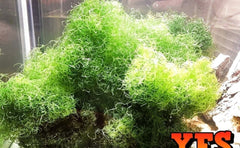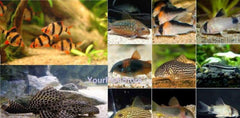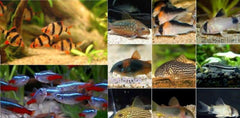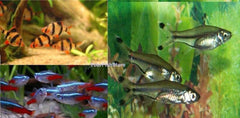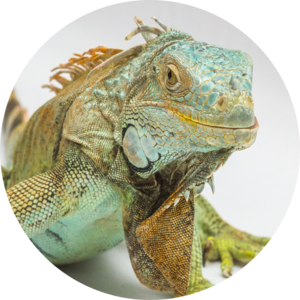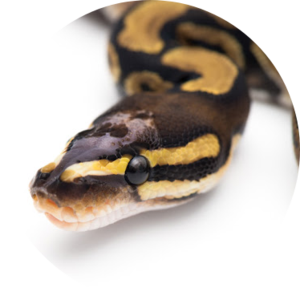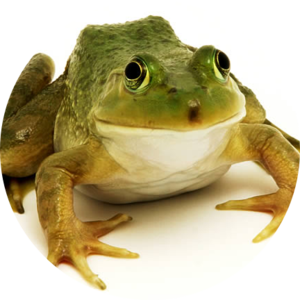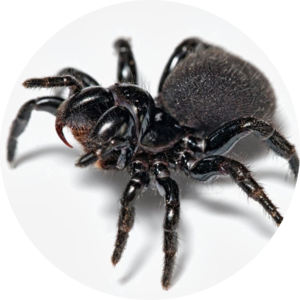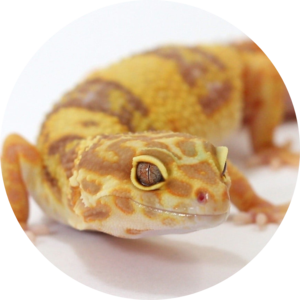X4 Assorted Oscar Sml/Med 2"-3" Each - X12 Assorted South American Cichlid Freshwater Fish Package

PACKAGE INCLUDES
x4 ASSORTED OSCAR SM/MD 2"-3" EACH
x12 ASSORTED SOUTH AMERICAN CICHLIDS
x4 ASSORTED OSCAR SM/MD 2"-3" EACH
x12 ASSORTED SOUTH AMERICAN CICHLIDS
________________________
x12 Assorted South American Cichlid SM/MD FRY - FRESH WATER LIVE FISH FREE SHIPPING
They will be scooped out our holding tanks. We cannot guarantee we will be able to scoop ALL different types, but we will try to get a good variety.
This package is for x12 Assorted South American Cichlids FRY / Approx 1"-2" EACH
Possible Random Selection that may be included when we scoop them out of holding tub:

Jack Dempsey Cichlid
Blue Acara Cichlid
Keyhole Cichlid
Green Severum Cichlid
German Blue Ram Cichlid
Peacock Bass Cichlid
Dovii Cichlid
Green Terror Cichlid
Apistogramma Pucallpaensis Cichlid
Thorichthys Ellioti Cichlid
Blue Kribensis Cichlid
Golden Dwarf Acara Cichlid
Vieja Argentea Cichlid
Chocolate Cichlid
Zebra Pike Cichlid
Neetroplus Nematopus Cichlid
Geophagus Altifrons Cichlid
Jewel Cichlid
Gold Severum Cichlid
Acarichthys Heckelii Cichlid
Texas Cichlid
Kribensis Cichlid
Pink Convict Cichlid
Geophagus Jurupari Cichlid
Sajica Cichlid
Krobia Itanyi Cichlid
Rainbow Cichlid
Firemouth Meeki Cichlid
Checkerboard Cichlid
Aequidens Diadema Cichlid
Longfin Gold Ram Cichlid
Paratilapia Bleekeri Cichlid
Vieja Argentea Cichlid
Bolivian Ram Cichlid
Electric Blue Ram Cichlid
Geophagus Brasiliensis Cichlid
Fire Red Apisto. Agassizi Cichlid
Herichthys Bocourti Cichlid
Black Convict Cichlid
Blonde Honduran Red Point Convict Cichlid
Albino Kyoga Red Xystichromis sp. Cichlid
Apistogramma Erythrura Cichlid
Balloon Blue Ram Cichlid
Balloon Electric Blue Ram Cichlid
Bandit Cichlid
Double Red Apisto Cacatouides Cichlid
Electric Blue Acara
Geophagus sp. Rio Negro Cichlid
South American cichlids are attractive, active, are generally quite durable fish. They are found in a range of sizes and with some very beautiful coloration.
Their behaviors are very intriguing, and many interact with their keepers and their environment making them favorite aquarium fish for many hobbyists.
Cichlids are found around the globe, in the Americas, Africa and parts of Asia. The “type specimen” for the cichlid family is the South American cichlid Cichla ocellaris, commonly known as the Peacock Bass or Peacock Cichlid. Thus the American cichlids are sometimes referred to as the “true cichlids” though all species are actually true cichlids.
The South American Cichlids or New World Cichlids are those found primarily in Central and South America, with a number of species native to Mexico, and the Texas Cichlid found in the southern part of North America. The actual number of cichlid species is unknown but estimated at more than 2000, with at least 1300 species scientifically described. South American Cichlids and Central American Cichlids are estimated at about 570 species.
They are categorized as "secondary freshwater fish" - meaning their ancestors were marine fish. It is believed that cichlids moved to freshwaters from the marine environment, and they have features relating to a number of marine species including the damsels, wrasses, parrot fish, and surfperches. This helps to explain why many species can do well in salty water, and in fact some species extend their range into parts of the ocean.
________________
x4 ASSORTED OSCAR SM/MD 2"-3" EACH - FRESHWATER LIVE FISH *FREE SHIPPING
This package is for x4 Assorted Oscar Fish Sm/md.
Minimum Tank Size: 50 gallons
Care Level: Moderate
Temperament: Aggressive
Water Conditions: 75-82° F, KH 8-15, pH 7.0-8.0
Max. Size: 7"
The Oscar is a South American cichlid also known as the Velvet Cichlid, Peacock Cichlid, or Walnut Cichlid. unfortunately, the common name "Peacock Cichlid" can be confusing since the term "Peacock" is also often used in the names of many Aulonocara species from Lake Malawi in the Rift Valley in Eastern Africa, and several species of the Cichla genus from South America are also called "Peacock Cichlids." In the early 1800's the Oscar was given the Latin name Lobotes ocellatus, but this has been updated to Astronotus ocellatus, a hopefully more accurate name.
Oscars are fairly large fish, typically reaching lengths between twelve and sixteen inches (thirty to forty centimeters). These fish generally live for eight to twelve years, depending on the quality of care given.
Oscar Equipment & Maintenance:
To keep your Oscar healthy in your home aquarium, remember to provide them with plenty of clean, warm water. Your Oscar's temperature should be about 77° Fahrenheit (25° Celsius), and ideally should remain between 74° and 81° F (23.5° and 27° C), so you need an aquarium heater and a thermometer. Keeping your Oscar too warm for long periods of time will result in Oxygen deprivation, which can cause nerve damage, heart damage, and can seriously hamper the immune system. Keeping them too cool or exposing them to sudden chill can also hamper their immune system. An impaired immune system makes them more susceptible to many diseases, from easily treatable Ick to more difficult diseases such as hole-in-the-head.
Your Oscar aquarium should provide at least 30 gallons of space (about 114 liters) per Oscar, plus any space needed for any other fish. A minimum fish tank size of 40 gallons (about 152 liters) is recommended if you are keeping an Oscar.
Oscars are very messy fish, so fish tank maintenance is paramount. Perform your weekly 10-15% water changes, so that your Oscar always has clean water and the waste that is not processed by the aquarium filter is removed. Your Oscar needs good filtration to keep the water from becoming toxic, and you need to keep the filter(s) well maintained. When selecting a filter, remember to make sure that the filter provides excess filtration for a fish tank with the large capacity that your Oscar requires. Many people use multiple smaller filters to maintain a large aquarium like this. Using several smaller filters allows you to stagger your filter maintenance so that you are not changing all of your filter media at once and risking cycling your fish tank again. Remember, it is very important that your filters provide filtration in excess of your total aquarium volume.
Oscar Food & Care:
Remember that your Oscar is primarily carnivorous (eats meat), so provide him with a high quality, high protein diet. Many high quality processed fish foods are available on the market today, and most frozen fish foods are also appropriate for feeding your Oscar.
In the wild, most Oscars eat primarily small fish, aquatic invertebrates, insects, and insect larvae, only opportunistically scavenging on an old carcass, nipping at the fins or scales of larger fish, or consuming plant matter. You are best off to try to duplicate this diet in the aquarium environment. Provide a wide variety of processed, frozen, and freeze dried foods.
Your Oscars should be able to consume all the food you offer within two minutes of feeding. If there is food in the fish tank after this time has elapsed, this contributes to poor water quality and make your Oscars more susceptible to disease.
Though Oscars will take live foods, feeding live goldfish is always a bad idea. Feeder goldfish are not a very nutritious food, and they are a good way to spread disease to your beloved Oscars.
You should only need to feed your Oscar once a day. If you feed more than once a day you increase the waste your fish are producing and also increase the risk of over feeding, so it becomes more important that you are performing your weekly 10-15% water changes and all necessary filter maintenance.
Providing a proper diet increases your Oscar's life expectancy and bolsters their immune system.
Oscars are less aware than most fish that they are prey animals. However, in order to feel comfortable, they need to have lots of hiding places. Oscars like to rearrange their territories, so, unless you don't mind the Oscar moving everything around on you, stick with large, heavy pieces that will be harder for the Oscar to get a hold of and move. Remember, you should avoid using sharp or rough decorations that your fish may get hurt on, in case your fish dart into them when startled. Like most other fish, they are more comfortable and will come out more and be more active if you can provide them with 50-75% cover - this means you should make half to three fourths of your fish tank space hiding places. Providing sufficient cover reduces stress and therefore improves your Oscar's immune system, reducing chance of disease.
Oscars do best if kept alone. However, you can select as tank mates other large South or Central American Cichlids, though it is imperative that you select ones that are neither too aggressive nor too passive, as the aggressive ones will beat up your Oscar and the passive ones will get beaten up... Some of the medium sized Pacu can also make good companions for an Oscar. If you do want to keep your Oscar with other fish, the fish should either be raised together or should be moved into a new fish tank together so that none of them have an established territory.
Remember, Oscars are beautiful living creatures. It is the responsibility of the pet owner to care for their pet and provide a healthy environment. So give your Oscar space, clean, warm water, plenty of hiding places, and high-quality, highly varied foods and he should be a good companion for a long time.
Customer Reviews
Based on 1 review
Write a review
QUESTIONS & ANSWERS
Have a Question?
Be the first to ask a question about this.



